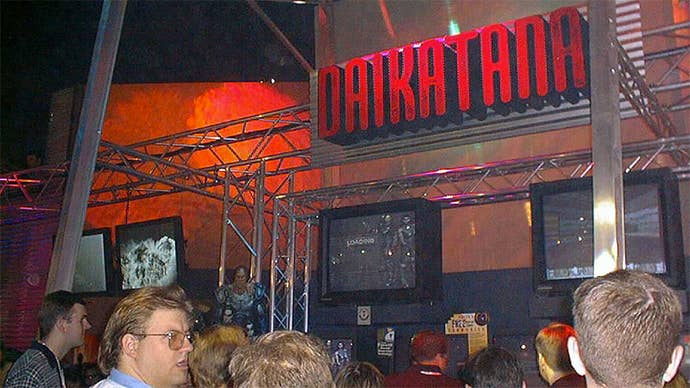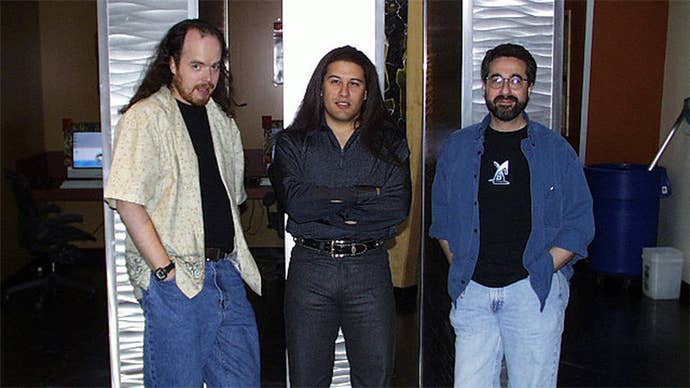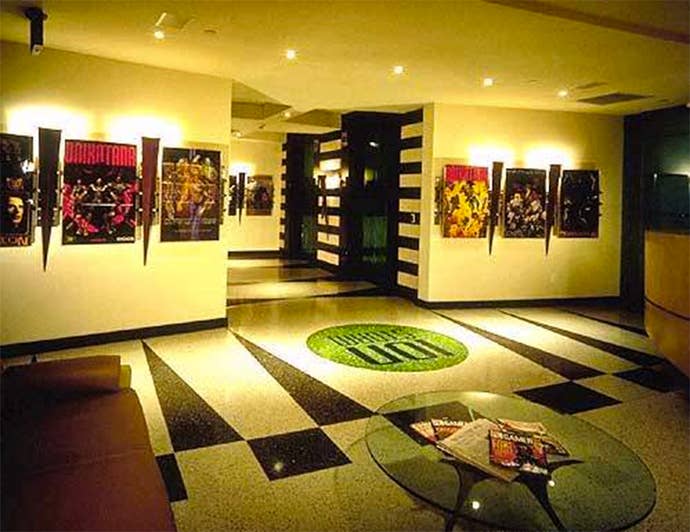Gaming's Greatest Flops: Daikatana
id Software's wunderkind promised the world, but his ambitious FPS died on the table. Did the rise of rock star developers crush John Romero's dream?
This article first appeared on USgamer, a partner publication of VG247. Some content, such as this article, has been migrated to VG247 for posterity after USgamer's closure - but it has not been edited or further vetted by the VG247 team.
Every Thursday this August, Gaming's Greatest Flops will examine one of our industry's biggest failures in an attempt to understand what went wrong. This week: Ion Storm's career-sinking failure, Daikatana (2000).
If you had to rank the most infamous video game marketing campaigns, Daikatana's would definitely come in at number one.
Across a garish red backdrop, its full-page ad offered a single quote, one that its subject will likely never live down: "John Romero's about to make you his b***h." Even ignoring the content of that sentence, Daikatana's ad communicates sheer arrogance. Who is John Romero, again? What are you trying to sell me? Can I at least have a date or something?
No. John Romero will tell you when he's ready. Now turn the page, and kindly "suck it down." (As the ad so thoughtfully suggests.)
Promoting your new game using rape imagery? Probably not the best idea. And this unfortunate advertisement would cast a long, dark shadow on Daikatana, which wouldn't see an actual release until three years later.
If you're wondering how such a thing could happen, we only need to turn back the clock 15 years and examine a curious phenomenon that only lasted until people fully comprehended its lunacy: "rock star" game developers. John Romero stood as the Elvis of this movement, and in retrospect, it's easy to see how we bought into the illusion. Here was a regular guy—a nerd, just like you and me—who dropped out of college and teamed up with a tiny group of other regular guys, creating a ludicrously profitable cultural touchstone in the process.

And hell, if celebrities from other media were permitted a certain degree of ostentatiousness, why not our video game superstars? For the average nerd, John Romero served as proof that one of us could cross over into a world once meant solely for good-looking extroverts who didn't know a line of code from a line of coke. (Though he did and continues to have a pretty luscious head of hair.)
In all fairness to Romero, he didn't have a hand in Daikatana's infamous ad, even if his rock star status made it possible. Ion Storm's Mike Wilson crafted its classy text, and if you're familiar with his latest (and now shuttered) company, Gamecock, you'd know the guy has a thing for controversy. During an Internet slap-fight in 2008, Romero commented on how Wilson's s**t-stirring at Gamecock wasn't much different from his behavior at Ion Storm:
"[Mike Wilson] hasn’t changed in over 10 years—these are the kinds of jackass stunts he pulled at Ion Storm with Daikatana. Remember the b***h ad? Yeah. He also ran ads (“image ads”) that just had pictures of Ion Storm founders, himself and our COO. That was just the beginning of his madness."

Ion Storm proved, without a doubt, that this rock star mentality just couldn't mesh with games. The studio began with some of the most promising talent in the industry at the time, united under the motto "design is law," but, like Image Comics five years prior, this new business suffered from the expected problems that happen when young people with big egos are given too much money to play with. And, working on a project with the scope and ambition of Daikatana, the only way production could have gone is down in flames.
With its inception coming just a year before the game-changing FPS, Half-Life, Daikatana promised to go places no FPS had gone before. Romero's latest game wouldn't be just another brainless, fast twitch shooter, frosted with Satanic imagery. Ion Storm's Daikatana would send players on a time-traveling, globetrotting adventure, with AI-controlled partners and more weapons and enemies than any FPS had ever seen. And the team planned on finishing the game in just seven months, in order to have it ready for the Christmas 1997 shopping season. Even in these early stages of development, Romero couldn't always coast on his rock star confidence: A Time Magazine article from E3 1997 has the beleaguered developer claiming there was "no chance" a game of its size could possibly ship by Christmas.
Little did Romero know, Daikatana would also miss the following two Christmases. While his abilities as a designer can't be denied thanks to his work at id, Romero's management skills left much to be desired. The internal strife at Ion Storm is enough to fill an entire book—and would make a killer made-for-TV movie—but you only need to take one look at their timeline to understand the poisonous environment that made Daikatana happen. After the game's initial delays, a significant portion of Daikatana's development team vacated, leaving Romero no choice but to lie through his teeth to the press, claiming they left at the perfect time. After all, the game was almost done! Right?

A 1999 Dallas Observer article paints a far uglier picture of Ion Storm's beautiful penthouse office space. By this time, Ion Storm had either fired or accepted the resignations of nearly half of its approximately 85 employees. And, based on reports from former Ion staffers, it seems Romero dealt with this stress by going MIA—if he was being called a rock star, why shouldn't he act like one? Mike Wilson's opinions on Romero should obviously be taken with a grain of salt, but his 1999 comments to The Observer, at least, ring true. "John had pretty much decided he had paid his dues and he was gone. He just wanted to do interviews and be John Romero. Just be a producer."
Was Romero encouraged to act out? Look at the articles written about him during his rise to fame, and you'll witness breathless accounts of this new brand of celebrity. The Time article in particular fawns over Romero's wealth and status, if only out of the sheer novelty that someone achieved it through video games, of all things:
"Romero in particular wore the mantle of pop-culture godhood with aplomb. If the four founders [of id Software] were, as Wired magazine dubbed them last August, "The Egos at id," then Romero, with his lion's mane of black hair, his Tudor mansion, his Testarossa, BMW and Humvee, was the superego."
Reading accounts of the conflicts at Ion Storm is as fascinating as it is tedious. With so many big egos constantly clashing, it's a wonder the studio didn't come to an end with a murder trial. While Warren quietly Spector worked on Deus Ex at Ion Storm's Austin branch, their Dallas HQ saw more than just Daikatana stall out in the pipelines—Dominion: Storm Over Gift 3 and Anachronox experienced their share of costly delays as well. It soon became clear that a developer who couldn't finish one game probably shouldn't be working on others, but the belief persisted that these guys could do anything. After years of broken promises, Daikatana released in May 2000—just a month before Spector's Deus Ex would advance the FPS in ways Romero only dreamed of. At this point, the writing was on the wall (thanks in part to an awful demo), and gamers met Daikatana with teeth bared. Romero was revealed as a fraud, undeserving of the lifestyle the media couldn't stop telling us about. He deceived us, and we wanted blood.

More than anything, Daikatana serves as an excellent parable about the dangers of celebrity, as well as the horrors of unchecked Capitalism. Romero did little to justify his studio's exorbitant costs, and his backers operated under the same sunk cost fallacy that caused the dot-com bubble to burst shortly after Daikatana's release. Since then, Romero's adventures in development have been much smaller, and he's only recently announced work on his first new FPS since Daikatana left a stain on his resume 15 years ago. Removed from the heady days of rock star development, an older, wiser Romero may finally have a chance to let his talents outshine his ego.
